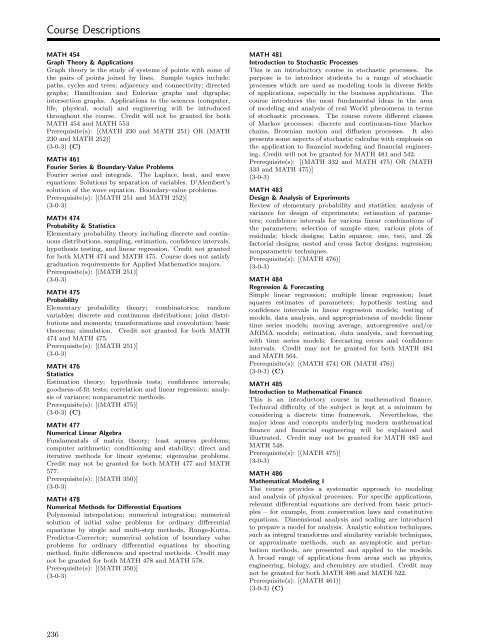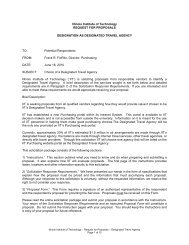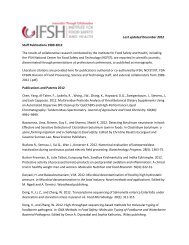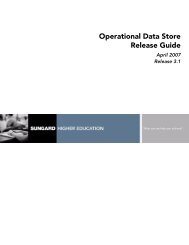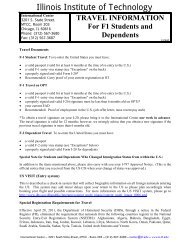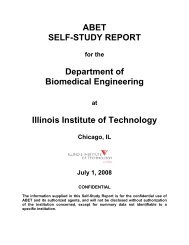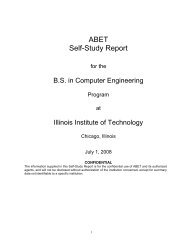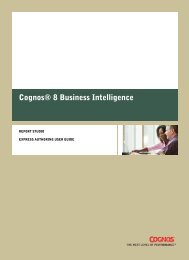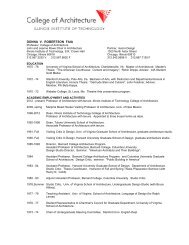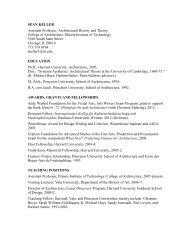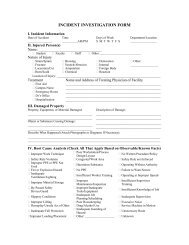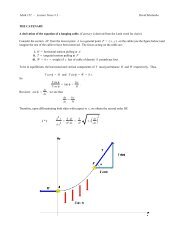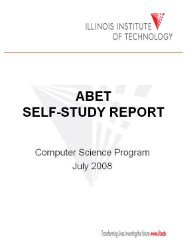Undergraduate Bulletin - Illinois Institute of Technology
Undergraduate Bulletin - Illinois Institute of Technology
Undergraduate Bulletin - Illinois Institute of Technology
You also want an ePaper? Increase the reach of your titles
YUMPU automatically turns print PDFs into web optimized ePapers that Google loves.
Course Descriptions<br />
MATH 454<br />
Graph Theory & Applications<br />
Graph theory is the study <strong>of</strong> systems <strong>of</strong> points with some <strong>of</strong><br />
the pairs <strong>of</strong> points joined by lines. Sample topics include:<br />
paths, cycles and trees; adjacency and connectivity; directed<br />
graphs; Hamiltonian and Eulerian graphs and digraphs;<br />
intersection graphs. Applications to the sciences (computer,<br />
life, physical, social) and engineering will be introduced<br />
throughout the course. Credit will not be granted for both<br />
MATH 454 and MATH 553<br />
Prerequisite(s): [(MATH 230 and MATH 251) OR (MATH<br />
230 and MATH 252)]<br />
(3-0-3) (C)<br />
MATH 461<br />
Fourier Series & Boundary-Value Problems<br />
Fourier series and integrals. The Laplace, heat, and wave<br />
equations: Solutions by separation <strong>of</strong> variables. D’Alembert’s<br />
solution <strong>of</strong> the wave equation. Boundary-value problems.<br />
Prerequisite(s): [(MATH 251 and MATH 252)]<br />
(3-0-3)<br />
MATH 474<br />
Probability & Statistics<br />
Elementary probability theory including discrete and continuous<br />
distributions, sampling, estimation, confidence intervals,<br />
hypothesis testing, and linear regression. Credit not granted<br />
for both MATH 474 and MATH 475. Course does not satisfy<br />
graduation requirements for Applied Mathematics majors.<br />
Prerequisite(s): [(MATH 251)]<br />
(3-0-3)<br />
MATH 475<br />
Probability<br />
Elementary probability theory; combinatorics; random<br />
variables; discrete and continuous distributions; joint distributions<br />
and moments; transformations and convolution; basic<br />
theorems; simulation. Credit not granted for both MATH<br />
474 and MATH 475.<br />
Prerequisite(s): [(MATH 251)]<br />
(3-0-3)<br />
MATH 476<br />
Statistics<br />
Estimation theory; hypothesis tests; confidence intervals;<br />
goodness-<strong>of</strong>-fit tests; correlation and linear regression; analysis<br />
<strong>of</strong> variance; nonparametric methods.<br />
Prerequisite(s): [(MATH 475)]<br />
(3-0-3) (C)<br />
MATH 477<br />
Numerical Linear Algebra<br />
Fundamentals <strong>of</strong> matrix theory; least squares problems;<br />
computer arithmetic; conditioning and stability; direct and<br />
iterative methods for linear systems; eigenvalue problems.<br />
Credit may not be granted for both MATH 477 and MATH<br />
577.<br />
Prerequisite(s): [(MATH 350)]<br />
(3-0-3)<br />
MATH 478<br />
Numerical Methods for Differential Equations<br />
Polynomial interpolation; numerical integration; numerical<br />
solution <strong>of</strong> initial value problems for ordinary differential<br />
equations by single and multi-step methods, Runge-Kutta,<br />
Predictor-Corrector; numerical solution <strong>of</strong> boundary value<br />
problems for ordinary differential equations by shooting<br />
method, finite differences and spectral methods. Credit may<br />
not be granted for both MATH 478 and MATH 578.<br />
Prerequisite(s): [(MATH 350)]<br />
(3-0-3)<br />
MATH 481<br />
Introduction to Stochastic Processes<br />
This is an introductory course in stochastic processes. Its<br />
purpose is to introduce students to a range <strong>of</strong> stochastic<br />
processes which are used as modeling tools in diverse fields<br />
<strong>of</strong> applications, especially in the business applications. The<br />
course introduces the most fundamental ideas in the area<br />
<strong>of</strong> modeling and analysis <strong>of</strong> real World phenomena in terms<br />
<strong>of</strong> stochastic processes. The course covers different classes<br />
<strong>of</strong> Markov processes: discrete and continuous-time Markov<br />
chains, Brownian motion and diffusion processes. It also<br />
presents some aspects <strong>of</strong> stochastic calculus with emphasis on<br />
the application to financial modeling and financial engineering.<br />
Credit will not be granted for MATH 481 and 542.<br />
Prerequisite(s): [(MATH 332 and MATH 475) OR (MATH<br />
333 and MATH 475)]<br />
(3-0-3)<br />
MATH 483<br />
Design & Analysis <strong>of</strong> Experiments<br />
Review <strong>of</strong> elementary probability and statistics; analysis <strong>of</strong><br />
variance for design <strong>of</strong> experiments; estimation <strong>of</strong> parameters;<br />
confidence intervals for various linear combinations <strong>of</strong><br />
the parameters; selection <strong>of</strong> sample sizes; various plots <strong>of</strong><br />
residuals; block designs; Latin squares; one, two, and 2ˆk<br />
factorial designs; nested and cross factor designs; regression;<br />
nonparametric techniques.<br />
Prerequisite(s): [(MATH 476)]<br />
(3-0-3)<br />
MATH 484<br />
Regression & Forecasting<br />
Simple linear regression; multiple linear regression; least<br />
squares estimates <strong>of</strong> parameters; hypothesis testing and<br />
confidence intervals in linear regression models; testing <strong>of</strong><br />
models, data analysis, and appropriateness <strong>of</strong> models; linear<br />
time series models; moving average, autoregressive and/or<br />
ARIMA models; estimation, data analysis, and forecasting<br />
with time series models; forecasting errors and confidence<br />
intervals. Credit may not be granted for both MATH 484<br />
and MATH 564.<br />
Prerequisite(s): [(MATH 474) OR (MATH 476)]<br />
(3-0-3) (C)<br />
MATH 485<br />
Introduction to Mathematical Finance<br />
This is an introductory course in mathematical finance.<br />
Technical difficulty <strong>of</strong> the subject is kept at a minimum by<br />
considering a discrete time framework. Nevertheless, the<br />
major ideas and concepts underlying modern mathematical<br />
finance and financial engineering will be explained and<br />
illustrated. Credit may not be granted for MATH 485 and<br />
MATH 548.<br />
Prerequisite(s): [(MATH 475)]<br />
(3-0-3)<br />
MATH 486<br />
Mathematical Modeling I<br />
The course provides a systematic approach to modeling<br />
and analysis <strong>of</strong> physical processes. For specific applications,<br />
relevant differential equations are derived from basic principles<br />
– for example, from conservation laws and constitutive<br />
equations. Dimensional analysis and scaling are introduced<br />
to prepare a model for analysis. Analytic solution techniques,<br />
such as integral transforms and similarity variable techniques,<br />
or approximate methods, such as asymptotic and perturbation<br />
methods, are presented and applied to the models.<br />
A broad range <strong>of</strong> applications from areas such as physics,<br />
engineering, biology, and chemistry are studied. Credit may<br />
not be granted for both MATH 486 and MATH 522.<br />
Prerequisite(s): [(MATH 461)]<br />
(3-0-3) (C)<br />
236


